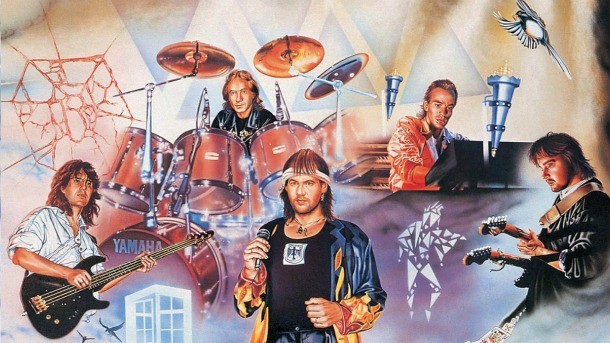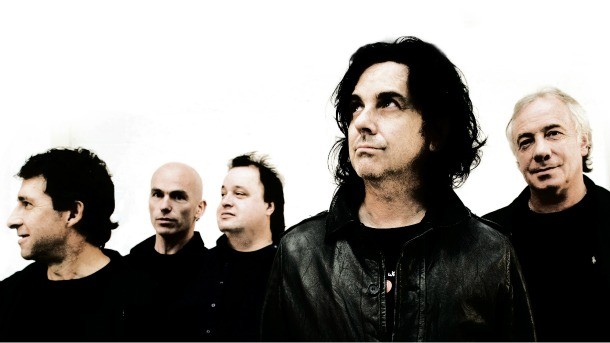007 First Light headlines our newest issue about the most anticipated games of 2026 and beyond. Subscribe now!
How An Obscure Prog Rock Band Kickstarted A Game Revolution

Since Double Fine used the site Kickstarter to raise over $3 million for its as-yet-unannounced adventure, crowd-funded video game projects have become a phenomenon in the industry.
Eschewing the traditional route of securing development money from major publishers or investors, many game developers are going directly to the fans. By pledging money upfront for a game they want to see made, fans can support the developers they love. So far, video games and Kickstarter have been a perfect combination. Currently, three of the top ten Kickstarters of all time in terms of money earned are game projects – Double Fine’s new adventure game, Wasteland 2, and ShadowRun Returns.
However, the idea of crowdfunding is not new – and it didn’t begin with Kickstarter. Rather, it was a cult English progressive rock band that’s little known outside of its native country. Tim Schafer, please tip your hat to Marillion.
Marillion formed in 1979, at the height of England’s punk revolution. The band trafficked in complex musicianship and long-form compositions at a time when it couldn’t have been less fashionable. As the ‘80s and ‘90s wore on, they switched singers and adapted a slightly more pop-friendly direction. In essence, they’ve made a good career out of being the poor man’s Genesis. Maybe a better way of putting it is they are the kind of band that would think this was a good idea for an album cover:

Knotty progressive rock isn’t the way to become a global pop sensation, but it does earn you a tremendously loyal following. Like many prog fans, Marillion fans are a rabid lot, allowing to band to continue to play large venues that more high-profile groups would have trouble selling out.

The band was also canny enough to recognize possibilities of the Internet early on. Starting in 1996, the band began using its official site as a way to interact with its fans. Today, the band even offers a “Crash Course” full-length sampler CD for free download on its official site. The good feelings this fan-friendly approach engendered paid off for the band the next year. Frustrated by not being able to see their favorite band live, U.S. Marillion fans took to the Internet and raised over $60,000 to send the band on its 1997 stateside tour. Many consider this the first major crowd-funding effort in entertainment history.
By 2001, the band was still a staple of the touring circuit, but was struggling to maintain its profile in the music business. Its distribution deal with Castle had turned sour; the band felt the label wasn’t doing enough to promote the group’s albums. Based on its previous success with a fan-funded tour, Marillion made a decision that is still reverberating through the entertainment industry today.
The group decided to ask its fans to donate money that would fund the recording and manufacture of its next album, Anoraknophobia. To its surprise, over 12,000 fans responded – paying £16 each. The amount raised was more than enough to record the album (the band operates its own recording studio). Long before Kickstarter, this was an indication that people were willing to give money to artists – be it musicians or game developers – that they love, and even pay in advance.
Interestingly, the band also anticipated the “extras” that are now standard for most Kickstarter campaigns. For example, every fan that pledged to the Anoraknophobia fund drive received a deluxe edition of the CD, which came with a bonus disc. Also, every donor was listed by name in the album’s CD booklet. After the release of the album, the band sold fans the individual multi-track masters of the entire album for £60, allowing them to manipulate and remix the tracks themselves. This was tied to a contest that awarded £500 to the best fan-made remix. When the album was finally released, it sold over 100,000 copies without the support of a major record label, a tremendous financial success.
Marillion continued to rely on fan funding for the albums Marbles (2004) and Happiness Is The Road (2008). In the case of Marbles, the funding wasn’t used for the recording expenses, but rather a promotional campaign for its release. The result? The 20-plus year old progressive rockers scored a top 10 single (“You’re Gone”) for the first time since 1987. Both albums released as special multi-disc editions for fans that pledged money to the campaigns.
As with the extras and bonuses that would be used by video game Kickstarters, the band found other ways to become involved with its followers. Fans were invited to pick out setlists for live shows, join the band onstage, or even create their own music videos for the band’s tracks.
It’s remarkable how well Marillion anticipated the Kickstarter revolution that is offering an alternative option for funding games to the traditional developer/publisher relationship. Instead of railing against the record industry or complaining about piracy, the band recognized that its relationship with the fans was its most valuable asset – one that could allow it to create the music it wanted to make without constraints or compromise. It’s the same journey that many developers in the game industry have just begun. Not bad for a bunch of old rockers from England.

Get the Game Informer Print Edition!
Explore your favorite games in premium print format, delivered to your door.
- 10 issues per year
- Only $4.80 per issue
- Full digital magazine archive access
- Since 1991









